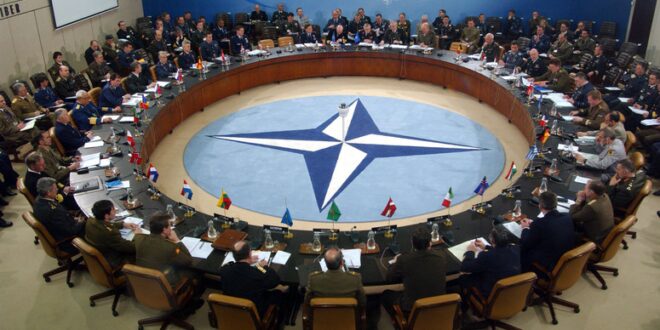Complacency has been the hallmark of NATO expansion. Over time, it has even become a form of derision, notably directed against Russia. As with many historical matters, records ignored can be records revisited, the second time around sometimes nastier than the first.
With the Ukraine conflict raging, a few of Russia’s neighbours have reconsidered their position of military non-alignment and neutrality. Last month, both Sweden and Finland submitted membership applications to formally join the North Atlantic Treaty Organization.
This reconsideration must be taken with the heaviest of qualifications. Sweden and Finland, while they have claimed neutrality and non-alignment status, have hardly been neutral on the subject of cooperation with NATO. Since the 1990s, Sweden has become an increasingly important partner of the alliance, using its military in concert with NATO exercises. Finland, with its 280,000 troops and 900,000 reservists, also boasts an interoperability function with the alliance.
Admission to the security club does, however, come with the requirement of unanimity from current members. As things would have it, one country has shown little enthusiasm to acquiesce to the plan. Turkey, at times the large fly in the pact’s ointment, sees an opportunity to extract concessions and muddy the pool of consensus. With the Russian invasion, the Erdoğan regime has broadened its military and political efforts against its long-term enemies, the Kurds. Militarily, Turkish forces have intensified efforts in Kurdish-run parts in northeast Syria. Politically, President Recep Tayyip Erdoğan hopes to have Sweden and Finland surrender a number of Kurdish dissidents, or terrorists, as he prefers to call them.
The point for Turkey regarding the Kurdish issue is far from new. In 2009, Erdoğan kicked up a fuss by blocking the appointment of former Danish Prime Minister Anders Fogh Rasmussen as NATO chief, citing Denmark’s sympathies for “Kurdish terrorists”. He also accused Rasmussen of failing to heed Turkish requests to ban ROJ TV, a Danish-based station linked to the Kurdistan’s Workers’ Party, the PKK. The appointment did eventually come through after much haggling and a solemn promise from President Barack Obama that a Turk would be given a prominent leadership role.
Be it NATO relations with Israel, efforts to bolster Eastern European states against Moscow, or the acquisition of Russia’s S-400 missile defence system, Erdoğan has proved a determined spoiler. In 2020, he sorely tested NATO relations by teasing Greece with a gas-exploration ship backed by fighter jet support. The Oruç Reis was sent to waters in the East Mediterranean claimed by Turkey, with the purpose of exploring hydrocarbon reserves. France deployed its own ships in support of Greece. NATO had gotten into a squabble with itself.
The PKK continues its unrelenting guerrilla campaign on behalf of the large Kurdish minority within Turkey, one it has waged since 1984. While the party is listed as a terrorist group by the EU and the United States, Sweden and Finland have generally opposed extradition of its members and sympathisers. For its part, Sweden has welcomed somewhere in the order of 100,000 Kurds since the 1970s. Erdoğan, in typically blunt fashion, has accused Sweden of being a “hatchery” for “terrorist” organisations.
Ankara is also unlikely to have forgotten the condemnation by Finland and Sweden of its military incursion into Syria in 2019, a move that was accompanied by restrictions on weapons sales.
Last month, Turkey’s Justice Ministry noted the rejection by Helsinki and Stockholm of the request “for the extradition of people with links to the PKK and Gülenist Terror Group (FETÖ)”. In terms of numbers, six members of the PKK and six from FETÖ have been sought for the last five years, while a further 21 “suspects” have bulked the list.
The affair has become something of a spectacle. Sweden has extended an arm to Ankara, hoping to pacify Erdoğan even as he tells members of his Justice and Development Party (AK Party) about the devious way Stockholm and Helsinki have tried to rebrand the PKK in other theatres, such as Syria.
The propitiating move has caused tremors of worry within Sweden. “If you want to sell everything for NATO membership,” stormed Swedish lawmaker Amineh Kakabaveh, “then go ahead but I think it’s awful.”
A note of determined stroppiness has also been struck. “Let’s not fall into Erdoğan’s trap,” urged 17 cultural and literary figures in an opinion piece published by Dagens Nyheter. Other Swedish papers, including Aftonbladet, Expressen and Svenka Dagbladet also ran the piece titled “Do not hand over the publishers to Erdogan!” The key concern: the demand from Ankara that various journalists, writers and publishers be surrendered to Turkish authorities.
This point is particularly biting, given that many of these figures have become Swedish citizens. But it is also of concern given Turkey’s notoriously poor record in treating members of the fourth estate. The stern op-ed recalls “the attacks and assassination attempts against prominent journalists, Can Dündar, in Istanbul, Erk Acarer in Berlin, and Ahmet Dönmez in Stockholm.”
There is a certain irony in the Swedish and Finnish decision, not least in claimed efforts to bolster their security against an authoritarian Russia. NATO, despite supposedly promoting liberal democratic values, has members (Turkey and Hungary spring to mind) who are much at odds with them.
An authoritarian Turkey, argue the 17 signatories, is fiendishly attempting to insinuate its own values into the Swedish political and legal system. The Turkish leader’s “political manoeuvre to extradite the people who took refuge in Sweden to be free as an attempt to export his own understanding of freedom of expression to our country, Sweden.”
Despite the tangle, NATO Secretary-General Jens Stoltenberg is convinced “that we will be able to address the concerns that Turkey has expressed in a way that doesn’t delay the membership”. In the final heave-ho, all eyes will be on what concessions will go Erdoğan’s way.
 Eurasia Press & News
Eurasia Press & News




